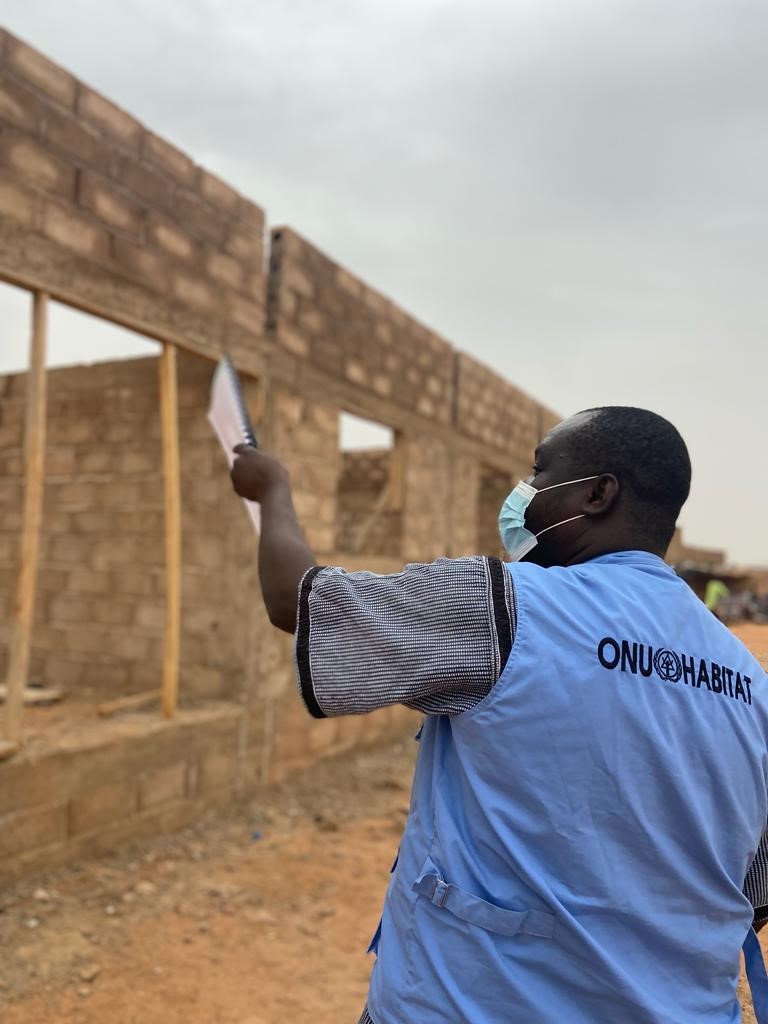Ouagadougou, Burkina Faso, 17 March 2022 – Showing its alignment to both needs on the ground and working in line with other United Nations agencies, a UN-Habitat project is providing an integrated approach, aligned with the country’s Humanitarian Response Plan (HRP) published this month.
The HRP, published March 4, underlines the country’s urgent need for shelter, WASH, schooling and education and food for people in vulnerable situation.
The security situation in the country has led to 1.7 million people becoming internally displaced, many of them finding refuge in urban areas.
Most affected by the internal displacement are women and children, as insecurity has led to the closure of more than 3,500 schools and health facilities in areas where violence and threats by unidentified armed groups has forced populations to leave. Thousands of children are out of school, although some attend school in the areas in which they find safety and shelter.
Classrooms have become overcrowded as the number of children has increased, impacting learning capacities and complicating the task of teachers.
UN-Habitat is currently implementing the project "Strengthening the Resilience of Local Communities in Urban Displacement Context and the COVID-19 Pandemic" to address the urgent need for increased access to services. The project includes constructions of additional health centers and expands school facilities in areas most needed: the four cities of Kaya, Kongoussi, Tougouri, and Dori.
The project, with its integrated and area-based interventions, underscores UN-Habitat's approach to advancing the links between humanitarian, development, and peace in Burkina Faso, in line with the agency's overall strategy. The project will also increase access to housing for people in vulnerable situations, based on UN-Habitat’s objective to “put housing in the center.”

UN-Habitat, through its projects in different countries impacted by displacement, has proven that integrated, area-based, and multi-sectoral, inclusive processes in urban areas can support an effective and long-term response within a humanitarian-development-peace nexus approach.
In the context of the Sahel crisis, UN-Habitat has invested in capacity and resources of urban areas to advance sustainable solutions by strengthening social cohesion and ensuring improved living environment as one element for achieving peace and reducing inequalities.
The UN-Habitat project, funded by the European Union through the Instrument Contributing to Stability and Peace, is being implemented in collaboration with the Ministry of Urbanization, Land Affairs and Housing, the local authorities of the four beneficiary municipalities, and with support of “Agence Perspectives” as implementing partner.
UN-Habitat’s participatory planning process led to the establishment of the Municipal Urban Resilience Units, which in coordination with priorities set by the local authorities, agreed with host and displaced communities on an investment plan.
The constructions of public infrastructures --classrooms, maternity wards and dispensaries-- in the four cities started in January while the construction of boreholes, housing and green public spaces will begin soon.
By ensuring that the living conditions of all the inhabitants of a neighbourhood are improved, the project contributes to strengthening social cohesion between local and displaced communities.
"We hope that the additional classrooms being built in our school will allow us to provide a better learning environment for children and teachers,” said Franck Simpore, Director of the Loulouka B school in Kongoussi, which now hosts 180 students more than the 300 it did before the conflict.